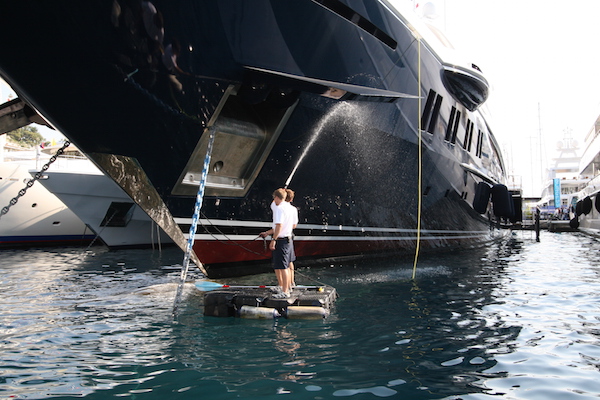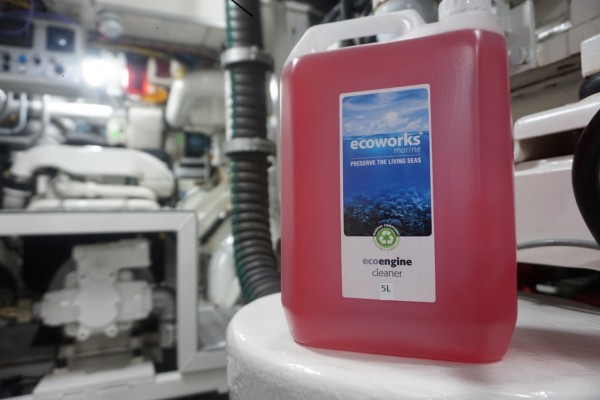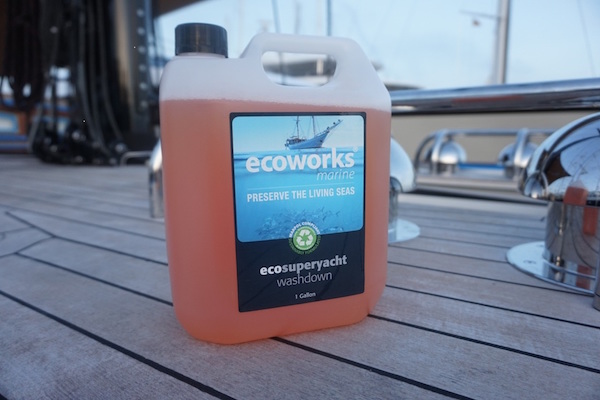What does ‘eco-friendly’ really mean?
Ecoworks Marine CEO explains how superyacht cleaning products can be favourable to the marine environment …
Taking care of the marine environment seems to be on our agenda more than ever, especially in yachting sector where the continuation of the industry relies heavily on the health of the seas. As such, many yacht owners and crew are looking for ways to reduce the pollutant impact of their yachts.
There are many clean brands on the marine market that claim to be ‘eco friendly’, but this is a term that is often bandied around too loosely. Most still contain harsh chemicals simply diluted down in order to validate their claim, which means less effective cleaning results in comparison to the harsher chemical used by the more mainstream products, hence giving all ‘eco’-labelled products a bad name.
It is possible, however, for products to be bio chemically formulated to ensure that their performance is as effective, and in some cases better, than the harsher, standard boat cleaning products. Ecoworks Marine, for example, upholds to have replaced the undesirable chemicals found in such products with naturally derived ingredients that are safer, non-hazardous, have non-irritant profiles and are more favourable to the marine environment.
“In traditional chemical cleaners there are a number of ingredients that are potentially harmful to human health, the environment and the surfaces on which they have been targeted to work,” explains Scott Johnston, CEO of Ecoworks Marine. “They generally clean by burning the dirt off using very high or very low pH acidic or alkaline solutions that, over time, gradually degrade the surface.”
By consisting of simple and natural ingredients that perform well but do not harm or degrade the surface on which they are used, carefully selected eco-friendly products can actually satisfy all goals in terms of performance, price and lowering the environmental footprint.
“The most important point is to select only eco-friendly ingredients from the outset, in terms of hazard profile and aquatic toxicity,” continues Johnston. “We replace undesirable ingredients wherever possible with eco-solvents, plant and fermentation extracts, naturally derived sustainable surfactants (soaps) and naturally occurring non-hazardous bacteria and enzymes. This ensures cleaning products that are non only less hazardous to the environment, but safer for the end user as well.”
Johnston explains introduction of the Detergent Regulations (EC) No 648/2004 and MARPOL Annex V has ensured that surfactants pass a more stringent ‘ultimate’ biodegradability test. Special industrial or institutional surfactants that do not fulfil the criterion of ultimate biodegradability within the given time period, must pass the test for ‘primary’ biodegradability (>80 per cent within the given period). However, this accounts for a very small proportion of surfactants that are used in more specialist applications. Thus, claiming a product is ‘eco-friendly’ or ‘green’ on account of its biodegradability is somewhat misleading, as essentially all surfactants used in detergent formulations should satisfy the biodegradability criteria as laid down in the Detergent Regulations. Biodegradability is a standard requirement, not a standalone property that makes a product environmentally- or eco-friendly.
Furthermore, some manufacturers claim that a product is eco-friendly if it has been formulated with just microbes and enzymes. “While there is most definitely a place for biotechnology in cleaning products, this on its own does not make a product eco-friendly – consideration has to be given to every ingredient in a formulation,” Johnston continues.
“Many products on the market that contain bacteria have unsuitable enzyme abilities for the job they are designed to do, or contain very low numbers of bacteria. Ecoworks Marine carries out extensive testing on a panel of bacterial strains to ensure they are ideally suited to each task and product type. Each product contains a laboratory controlled bacterial specification that is considered appropriate for each application. Our bacteria and enzymes work in synergy with the cleaning components to optimise cleaning performance and odour control.”
As a side note, the bacteria used in such products that come into contact with food areas have been extensively tested so that they do not produce enteric or emetic toxins, and hence can be used in safety in the galley. The Ecoworks range also consists of exterior products, including boat wash and teak deck cleaner, and interior products, including surface cleaner and laundry detergent, and specific products for the engine room and bilge.
The main philosophy behind environmentally friendly products is the use of sustainable ingredients wherever possible, meaning that products will perform well without the necessity of harmful components, and use only naturally occurring bacteria and enzymes. There are many pretenders on the market, which can only add to confusion over the environmental impact of certain cleaning products, and as such proper attention should be being paid to each product used on board.
Profile links
Ecoworks Marine Preserve The Living Seas Ltd
Click here to become part of The Superyacht Group community, and join us in our mission to make this industry accessible to all, and prosperous for the long-term. We are offering access to the superyacht industry’s most comprehensive and longstanding archive of business-critical information, as well as a comprehensive, real-time superyacht fleet database, for just £10 per month, because we are One Industry with One Mission. Sign up here.






